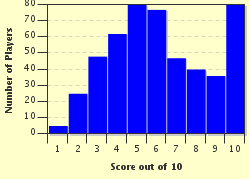Quiz Answer Key and Fun Facts
1. The Kurukshetra War narrated in the Hindu epic "Mahabharata" was an eighteen day long battle between two warring factions of the same family. Which two groups of cousins fought against each other in this war?
2. Which number is considered lucky in Jewish tradition due to its association with the Hebrew word for 'life'?
3. Which Asian philosophy is based on the five elements of water, fire, earth, wood and metal?
4. The number three appears to be associated with quite a few important people and events in Norse mythology. Which of the following is NOT one of them?
5. In the Hindu epic "Ramayana", when Rama was sentenced to exile in the forest for fourteen years nobody accompanied him.
6. While the Hindu king Rama was in exile, his wife Sita was kidnapped by a ten headed king of a neighbouring country. What was his name?
7. Which of the following is NOT one of the nine muses in Greek myth?
8. What kind of creature was the six-headed Scylla in Greek mythology?
9. In which of the following religions does the number 19 assume significance?
10. The 'Twelve Labours of Hercules' are a well known part of Greek myth. Hercules undertook these labours as penance for having killed his sons in a fit of insanity.
Source: Author
zorba_scank
This quiz was reviewed by FunTrivia editor
looney_tunes before going online.
Any errors found in FunTrivia content are routinely corrected through our feedback system.


